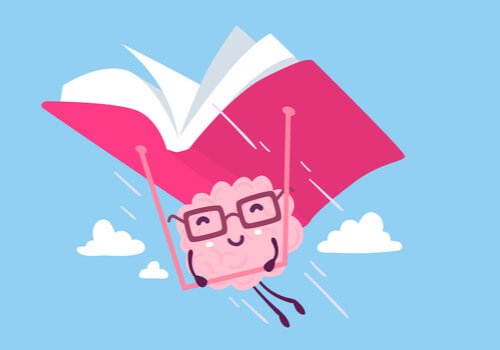The Magical Effect of Reading on Our Brain

When we read novels, fiction stories, and essays, we imagine situations, scenarios, and characters. By turning their pages, we create mental images of faces, dresses, landscapes, spaces, and distances. And that’s where the magical effect of reading begins in our brain.
Reading, as an activity, is the perfect opportunity to disconnect and relax our internal dialogue. It stops the reproaches, the accusations, and the thoughts regarding the problems we’re not able to solve. All this activates many of the regions in our brain.
Language in the right hemisphere
Neurologist Guillermo Garcia Ribas argues that there are two aspects that reading facilitates: the decoding of language and symbolic thought. In addition, Alex Huth is part of the team that has mapped the brain’s semantic system. Surprisingly, he discovered that language isn’t limited to the left hemisphere, as we believed until now. It seems that the production of language belongs to this area instead. However, much of the understanding of language seems to occur in the right hemisphere.
“There’s a connection between the areas of interpretation of symbols (words) and other areas.”
-G. Ribas-

Reading activates our mental GPS
Neuroscientist Aidan J. Homer argues that the representation of mental images affects the cortical and subcortical neuronal system. It also activates a network of grid cells, or grid neurons, in the entorhinal cortex. These grid cells are responsible for spatial localization. That is, they make the brain understand its position in space.
They’re activated during the mental images created from reading a description of characters in an environment. This also happens when we imagine ourselves in a place. They do it in the same way they would do before visual or auditory stimuli.
These grid neurons show a strong regulation of theta waves. They’re electrical impulses of long amplitude related to the reorganization of the cerebral structure. They’re also low-frequency waves. In this regard, some think that they facilitate access to unconscious contents.
Theta waves are characteristic of sleep phases 1 and 2 of in adults. However, children spend their waking time in theta wave state during their first years of life. When this occurs during wakefulness in adults, something similar occurs to the state of consciousness achieved after training in meditation or hypnosis.
That is, one of the effects of reading on our brain is that it facilitates the state of consciousness that gives access to the unconscious. At the same time, there’s a reorganization of brain structures and neural networks.
Mirrors to look at
Robert Harris at Emory University conducted an MRI scan on a group of people during the days it took them to read a novel. The study yielded some amazing results.
The characters’ movements activated different brain areas in the readers. The activated areas were the ones that would have activated if they were performing the movements themselves. In addition, an important reinforcement was found in the neuronal connections of the central groove. This organ is linked to bodily sensations and empathy.

Leaving a mark on the brain
Robert Harris’ experiments yielded collateral results. The researchers discovered a neuronal imprint that reading a novel left days after having finished it. They conducted MRI scans on the same participants days after they finished reading. The researchers found that the increased connectivity during the reading period was maintained several days later, although the person was no longer reading the book.
They called this the “activity shadow“. The body still reels from the effects of books five days after having completed them. It even seems that our bodies could maintain the footprint even longer if we like the book a lot.
This “activity shadow” that comes from reading in our brain could explain why books are so magical. This is the same magic that allows characters and stories to stay with us even after we finish a book.
This text is provided for informational purposes only and does not replace consultation with a professional. If in doubt, consult your specialist.








